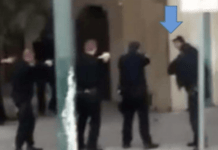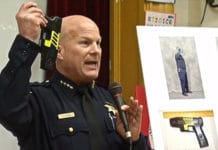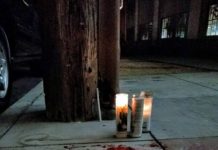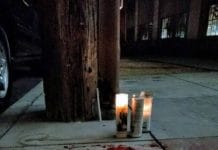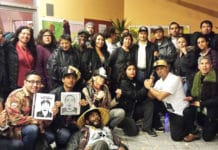by Julian Mark

More than 100 people turned out for a community meeting on Tasers Tuesday night, first breaking into small groups of roughly 25 each and then convening in a fiery public comment session that at one point erupted into activists chanting, “No Tasers!” and drowning out Police Commissioner Sonia E. Melara’s calls for order.
The Police Commission has voted against the use of Tasers three times in recent years – in 2004 and twice in 2010 – and has taken up the issue again because a 2016 Department of Justice report on the San Francisco Police Department recommended the city “strongly consider deploying” Tasers.
At Tuesday’s meeting, Police Chief Bill Scott made clear he believes Tasers are a necessary addition to the department’s existing set of non-lethal-force options while a majority of the public in attendance cried foul on adding them to an officer’s arsenal.
“Until SFPD shows that you’re prioritizing the way you’re going to transform from a warrior to a guardian culture,” Tasers should be opposed, said Adriana Camarena, a Mission District activist and an advocate for the families of police shootings, including Luis Gongora Pat, a man who police shot and killed in the Mission in April 2016.
“Then down the line we can talk about Tasers,” she added, provoking cheers and applause from the crowd.
While the pubic spoke, first in the small groups and later in the large session, Police Chief Scott and two of the seven commissioners – Robert Hirsch and Sonia E. Melara – listened and sometimes struggled to maintain order.
“Until SFPD shows that you’re prioritizing the way you’re going to transform from a warrior to a guardian culture,” Tasers should be opposed, said Adriana Camarena.
“You’re not in charge – the people are in charge,” Ilyich Sato, the rapper and activist known as Equipto who led the Frisco 5 in a hunger strike that won the resignation of previous SFPD Chief Greg Suhr, shouted at Commissioner Melara after she told a community member to wait until public comment to speak.
“Yes I am,” she shouted back
The crowd then erupted in a chant. “No tasers!” they repeated.
The commissioners – four who are appointed by Mayor Ed Lee, who supports Tasers, and three appointed by the Board of Supervisors – will take a vote sometime this fall.
Melara threatened to end the meeting if people failed to calm down. Once they did, Scott and the commissioners sat quiet for the most part, listening to community concerns.
“We really have to get out of the gizmo mentality and into better training,” said Ethan Davidson, 54, of the Tenderloin, who explained that an electronic device shock could be potentially lethal to him because liver disease and medication have made him physically frail.
Others were concerned about the disproportionate use of the weapons on minorities – a fact that Chief Scott has acknowledged in earlier testimony with the commission.
“We really have to get out of the gizmo mentality and into better training,” said Ethan Davidson.
“I don’t feel confident that the department has eliminated bias, and I know if they get tasers the people who will be disproportionately affected are people of color,” said Karen Fleshman, who has participated in SFPD working groups on bias. “They are not non-lethal, they are particularly lethal when used on people in mental health crisis … and they often fail.”
One person, Stephen Jaffe – who has launched a campaign to unseat Nancy Pelosi in the 2018 congressional election – said he came with an open mind, but it was quickly changed.
“I’ve been persuaded by the speakers and their reasoning,” he said, calling the officers on the perimeter “intimidating.”
Indeed, as the public comment session raged on – more than 30 people spoke for two minutes each – some 30 officers stood around the perimeter of the room.
Among them was Commander David Lazar, who was recently promoted to oversee the department’s policy on community policing.
“What I like about this experience is that it gives everyone a chance to voice their feelings, opinions and experience – and it’s important as a police department that we hear from everyone,” he said. “Tonight was a good dialogue.”
One person, Stephen Jaffe, said he came with an open mind, but it was quickly changed. “I’ve been persuaded by the speakers and their reasoning,” he said, calling the officers on the perimeter “intimidating.”
Did he believe the community would feel more comfortable with Tasers on police officers?
“At the end of the day the community is more concerned with our relationships and building trust,” he said. “We’re in favor of the Tasers because we need a less-lethal option, and we are going to have a comprehensive policy we’re going to have officers accountable to.”
Commander Peter Walsh, who oversees the department’s use-of-force policy, was also in the room. He elaborated on Lazar’s point that if the department is permitted to use tasers, “robust” training and accountability would be top priorities.
“If our officers aren’t using [Tasers] correctly, there would be consequences,” he said. “On a lower level, [consequences] can be anything from time off and retraining to termination, and on the high end, they can go to jail and go to prison.”
He cited the case of Bryce Masters, a 17-year-old male who was permanently injured after being tased by a police officer in Kansas City, Missouri. The officer was sentenced to four years in federal prison for violating Masters’s civil rights.
One attendee named Harold Miller said he supported tasers, even though he had himself been tasered in the back during a bar fight in Baltimore, Maryland, in 2013. He said the tool saved his life during an incident in which he grabbed a chair to use on police.
“You wouldn’t be talking to me now – I would have been dead,” he said, explaining that he believed officers would have shot and killed him had they not used the Taser. “It was amazing how this cop saved my life. I would thank him if I knew who he was.”
One attendee named Harold Miller said he supported tasers, even though he had himself been tasered in the back during a bar fight in Baltimore, Maryland, in 2013. He said the tool saved his life during an incident in which he grabbed a chair to use on police.
The Mission District’s own lawmaker, Supervisor Hillary Ronen, remains skeptical of Tasers.
“I don’t believe that Tasers are the answer,” she said in an interview earlier in the day. “The police have a variety of weapons they can use if they need to protect themselves and protect the neighborhood, and introducing a new weapon, where we have yet to fully implement the police reform measures that require a new form and focus on de-escalation technique, is exactly the wrong way to go.”
A second public meeting will be held on Sept. 19 at San Francisco City College’s Ocean Campus. The commission will vote on Taser use later this year.
Journalist Julian Mark specializes in police coverage for Mission Local, where this story first appeared. He can be reached at julian.mark@missionlocal.com. Bay View staff contributed to this report.

 Store
Store



